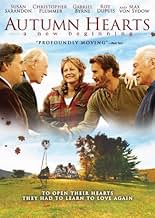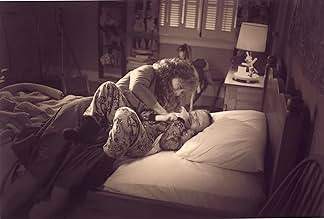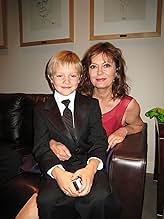अपनी भाषा में प्लॉट जोड़ेंA bond between three people in a German concentration camp is still there many years after they were split up, all deep scars from back then. One of them invites them to a reunion, and we're... सभी पढ़ेंA bond between three people in a German concentration camp is still there many years after they were split up, all deep scars from back then. One of them invites them to a reunion, and we're out for a night none of them will ever forget.A bond between three people in a German concentration camp is still there many years after they were split up, all deep scars from back then. One of them invites them to a reunion, and we're out for a night none of them will ever forget.
- निर्देशक
- लेखक
- स्टार
- पुरस्कार
- 7 कुल नामांकन
- Young Jakob
- (as Kris Holden-Reid)
- Girl on Bicycle
- (as Maeva Nadon)
- Red Cross Worker
- (as René-Madeleine Leguerrier)
फ़ीचर्ड समीक्षाएं
"Emotional Arithmetic" based on a novel by Matt Cohen (a Jew?), begins with an astounding remark "If you ask me if I believe in God, I am forced to answer does God believe in us?" The film is not about atheism. It reflects on the terrible scars left by war on orphans, on individuals who stand up and protest when wrong is done, on relationships forged in times of stress, pain and loss.
The charm of Paolo Barzman's film rests considerably in the hands of the capable actors-Susan Sarandon, Max von Sydow, Chistopher Plummer and Gabriel Bryne-all who have a maturity to carry off their parts in the film with grace. Ms Sarandon has matured into a formidable actress in recent films and this one showcases her talent.
Screened at the 12th International Film Festival of Kerala, India, the film forced this viewer to compare the contents of "Emotional Arithmetic" with those of a Swiss documentary "A Song for Argyris" also shown at the festival. Both films underlined the difficulties in forgetting tragic events in our lives and moving on. Both films indirectly discuss the bonding of survivors of tragic events.
As I watched the film I could not help but note the growing interest filmmakers in family bondsin "Emotional Arithmetic" it is merely a subplot balancing a "virtual" family that suffered during the Nazi rule with that of a real family comprising three generations living in idyllic conditions in Canada.
This film would offer considerable material to reflect on for the viewer, beyond the actual events shown on the screen.
Though there is no mention of a divine presence, the use of the vertical crane shots of the dining table and the car at interesting junctures in the film seem to suggest this debatable interpretation.
This Canadian film provides eye-candy locations that grab your attention from the opening shot. Mesmerizing crane shots are part of the film that provide an unusual charm to the high technical quality of the film, which becomes all the more apparent on the large cinemascope screen. So is the competent editing of the sequences that make the viewing process delectable. Like another Canadian film "Away from her" shown at the 11th edition of the festival, Canadian cinema has proved capable of dealing with serious subjects with the help of international actors, without resorting to the commercial gimmicks of mainstream American cinema, and employing high standards of craftsmanship in the true tradition of the famous Canadian filmmaker Claude Jutra!
But I gave it a lot of thought afterwards, and now the morning after, I think it is a very compelling picture worthy of a 2nd watch.
First I'll tell you why I initially hated it, maybe sparing you the misery. Everything about this film is extremely deceptive, setting up emotional expectations that are never fulfilled. The USA title "Autumn Hearts: A New Beginning" is way off the mark, and the DVD packaging is awful, describing it as "a tender love story of redemption, healing and reconciliation." HUH?? Did the marketing department even bother to watch the movie? If you watch this movie expecting a sentimental tear-jerker or a "tender love story", you'll find yourself hurling popcorn at the screen in disgust. It is none of those things, despite the sweeping, lush cinematography and Hallmark-greeting-card setting (complete with melodramatic musical score that does its best to yank our emotions to the surface). Whether deliberate or not, the film is very misleading in that respect.
If not a cryfest, what do you get instead? You get a marvellous, philosophical question that goes to the root of what we are as human beings. What is our job on this planet, and what are our limits of duty vs. survival? The movie investigates four major characters struggling with the same question, each taking a markedly different approach. Four peoples' lives have been twisted out of shape by the injustice of humanity. How do they react? One (Gabriel Byrne) suppresses the trauma under a veneer of British civility & reticence*. Another (Max von Sydow) has had the memories forcibly erased by chemicals and exectroshock experiments, though he still retains an inexplicable connection. A third character (Susan Sarandon) obsessively collects her memories, appointing herself as a sort of librarian of human injustice and in so doing, starts to lose her mind. And a fourth character (Christopher Plummer) is a secondary victim, suffering by association and trying his best to move ahead while realizing the impossibility of that notion.
The dynamic is incredibly well played. There is no clearcut answer, and each character plays against the others hoping to find the route to peace. I didn't find this to be an emotional film but instead a very intellectual puzzle. The original title "Emotional Arithmetic", while not as poetic or appealing as "Autumn Hearts", is definitely more appropriate if you choose to view the film as I described it. It is an almost scientific approach to the manipulation of emotions, bringing us back to the main question: is our job to hold on to the past, like living history books, toruted & martyred for the sake of teaching future generations? Or is our job to bury the ugly face of past injustice and focus on moving forward ourselves? However way you choose, the answer is represented by one (or more) of the four characters.
This film is a slow-paced philosophical soul teaser wrapped up in a bright-coloured (emotional) package. There's definitely a lot going on, much like a Wim Wenders film ("Lisbon Story", "Paris Texas") or a Hirokazu Koreeda film ("Maborosi", "After Life") though not nearly that slow. Another film I might compare it to is "The Shipping News" by Lasse Hallström but that comparison is mainly due to the director's way of using landscape & nature to create a mood. One thing about this film that no one will deny is that the setting (Quebec in the early Autumn) is about as beautiful & dreamy as any place on Earth.
*Yes, I know Gabriel Byrne is Irish, not British!
Melanie Winters (Susan Sarandon) lives on a picturesque farm in Canada with her retired university professor husband David (Christopher Plummer) and their grown son Benjamin (Roy Dupuis), an unexplained single father of his own son Timmy (Dakota Goyo) and caregiver for his physically ailing father and mentally fragile mother. Melanie lives in the past: as a child in 1942 she was interned in Drancy, an internment camp outside of Paris where she bonded with a young man Jakob Bronski and an Irish lad Christopher - taking on the responsibility of maintaining the written history of the camp at Jakob's request so that atrocities such as they were witnessing would never occur again ('Always remember'). At one point Jakob turned himself over to the Nazis to allow Melanie and Christopher to be released.
Now, years later, Melanie is still cataloging all of the atrocities in the world as they appear in the newspaper and continues to attempt to find Jakob. Jakob writes to her and soon is arriving in Canada as an elderly man (Max von Sydow), traveling with his surprise guest, the adult Christopher (Gabriel Byrne). It is this visit that reunites Melanie, Jakob, and Christopher that allows closure to their turbulent history and a healing not only for the three survivors but for Melanie's family also. It is as though it took a quiet time in the beauty of nature and the life-sustaining atmosphere of a farm to cleanse these 'autumn hearts' from the anguish of the past.
Not all of the elements of the story are resolved: we never learn much about Benjamin and his state of solo fatherhood, David's private life that so incenses Melanie, etc. But these are minor exclusions in this beautifully sculpted story and film. The cinematography by Luc Montpellier and the musical score by Normand Corbeil capture not only the beauty of the Canadian landscape and lush colors of the farm in autumn, but also heighten the authenticity of the Drancy camp experience in the black and white flashbacks. This is an exceptional film that deserves a wide audience. Grady Harp
क्या आपको पता है
- भाव
Timmy Winters: This is stupid.
Benjamin Winters: Why?
Timmy Winters: Because you're not supposed to separate the yolks from the whites. That's not why eggs were invented.
- क्रेज़ी क्रेडिटDedicated to Matt Cohen(1942-1989)
टॉप पसंद
- How long is Emotional Arithmetic?Alexa द्वारा संचालित
विवरण
- रिलीज़ की तारीख़
- कंट्री ऑफ़ ओरिजिन
- भाषा
- इस रूप में भी जाना जाता है
- Autumn Hearts: A New Beginning
- उत्पादन कंपनियां
- IMDbPro पर और कंपनी क्रेडिट देखें
बॉक्स ऑफ़िस
- बजट
- $68,00,000(अनुमानित)
- दुनिया भर में सकल
- $8,87,065
- चलने की अवधि
- 1 घं 39 मि(99 min)
- रंग
- पक्ष अनुपात
- 2.35 : 1





























